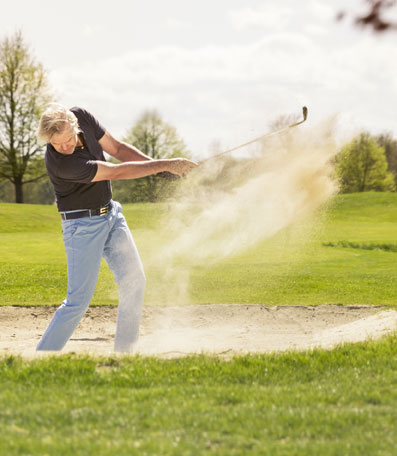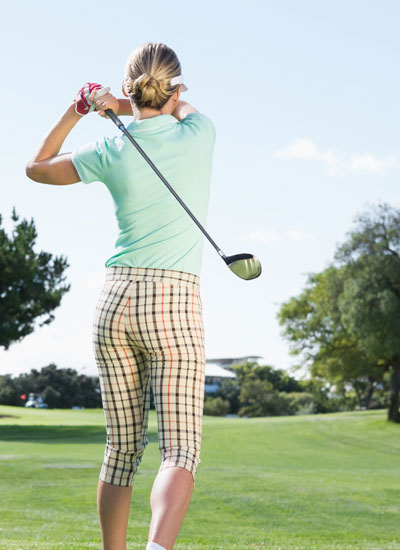
For many of us, there is no feeling quite like swinging a golf club on a pristine fairway by the water. If you enjoy playing golf, then you know what it’s like to hit that one perfect shot into the green on a sunny day as you watch a calm breeze blow across the flagstick.
Golf is a great choice if you’re looking to keep active, get outdoors and spend time with friends in the beautiful sunny weather. Golf is a relatively low-impact sport that can provide enjoyment for nearly every age group and fitness condition. As the saying goes, “A bad day of golf is better than a good day at work!” However, keep in mind that just like in other sports, golf injuries unfortunately can occur.
For those of us with a passion for golf, a sudden injury that knocks you off the links can be devastating. While taking time away from the game you love to rehabilitate can be bad enough, finding that you’ve slid back a few strokes when you return can be even worse. After you have recovered from an injury or surgery and find your golf game is no longer the same, a physical therapist can be helpful in getting you back on track as quickly as possible.
The Impact of Injury or Surgery on Golf Swing
When patients come to our clinics with concerns about golf performance, we help them identify what we refer to as “body faults.” These are areas of the body affected by an injury or surgery that have limited or restricted your range of motion. We often find that lower body injuries are more likely to have a greater negative effect on golf swing, but body faults can be anywhere from the neck down. Underestimating a body fault on the golf course can compromise everything from your stance, to the way you hold the club, and certainly your swing. No matter where your body fault lies, playing golf with limited mobility can result in further injury and probably cause you to give away a few strokes on the score card.
Making the Return to Golf with PT
Through Integrated Rehab’s Golf Performance Enhancement Program, our Physical Therapists can help improve your rotational strength, mobility and endurance. Because of their extensive educational background and experience, our PTs are biomechanical experts, so you can trust you’ll be in capable hands as you work to return to the game you love.
During the rehabilitation process, we will work to improve the body fault(s) that may be preventing you from achieving an optimal swing. A body fault that goes untreated will most likely increase stress elsewhere in the body and has the potential for injury at later date.
With that said, it is important to note that our PTs are not PGA tour professionals; we understand the mechanics of the body and can help improve any restriction that might be limiting your enjoyment of the game. If you’re serious about the accuracy of your shots, we recommend working with a PGA professional as you’re rehabilitating with us to better your score.
Prevent Future Golf Injuries

We all have a preconceived notion of how we should swing a golf club from watching professionals on TV, but most of the time our bodies do not match that expectation. When amateurs try to imitate 10-time PGA tour champion Jordan Spieth’s swing with a body that does not move the same way, frustration and potential pain can occur.
After trying to mimic a professional’s swing and experiencing an injury, we often hear patients say, “I know I need to exercise, but I don’t want to get hurt again.” We can certainly relate, as it can be hard to find motivation and time to stay active after an injury occurs. However, a body that is not active can be more prone to injury than one that stays in motion. Our Golf Performance Enhancement Program is open to players of all experience levels and degrees of fitness who want to avoid overexertion and injury.
You might not know you have a body fault that can be fixed by a physical therapist until you come in for an assessment. By analyzing your golf swing and making sure that your body is moving properly, we can help you get the most out of your game. Our patients are pleasantly surprised to find that physical therapy can have such a positive impact on their golf game.
Contact Integrated Rehab today to get closer to par during your next round!
Disclaimer: We always recommend following the guidelines of your primary care doctor after a serious injury or surgery before beginning a new regimen.

